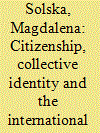|
|
|
Sort Order |
|
|
|
Items / Page
|
|
|
|
|
|
|
| Srl | Item |
| 1 |
ID:
086740


|
|
|
|
|
| Publication |
2009.
|
| Summary/Abstract |
The discourse on the integration of ethnic minorities in the Netherlands has undergone profound changes over the past few decades. This article analyses how discourses in politics and academia have revolved around changing emphases upon the social capital processes of 'bonding' of individuals within groups and 'bridging' of individuals to the wider society. Four episodes of discourse and policy may be distinguished: denial of being a country of immigration until the 1970s; the Minorities Policy in the 1980s; the Integration Policy of the 1990s; and the rise of a more assimilationist discourse after the turn of the millennium. The country thus began in the post-war period with a pluralist perspective toward integration rooted in the traditional religious and ideological 'pillarisation' of society, shifting first to a multicultural perspective, then to an integrationist and, finally, in the new millennium, to an assimilationist perspective.
|
|
|
|
|
|
|
|
|
|
|
|
|
|
|
|
| 2 |
ID:
106284


|
|
|
| 3 |
ID:
119681


|
|
|
|
|
| Publication |
2012.
|
| Summary/Abstract |
Why have European states introduced mandatory integration requirements for citizenship and permanent residence? There are many studies comparing integration policy and examining the significance of what has been interpreted as a convergent and restrictive "civic turn," a "retreat from multiculturalism," and an "inevitable lightening of citizenship." None of these studies, however, has puzzled over the empirical diversity of integration policy design or presented systematic, comparative explanations for policy variation. This article is the first to develop an argument for what, in fact, amounts to a wealth of variation in civic integration policy (including scope, sequencing, and difficulty). Using a historical institutionalist approach, the author argues that states use mandatory integration to address different membership problems, which are shaped by both existing citizenship policy (whether it is inclusive or exclusive) and political pressure to change it (in other words, the politics of citizenship). She illustrates this argument by focusing on three case studies, applying the argument to a case of unchallenged restrictive retrenchment and continuity (Denmark), to a case of negotiated and thus moderated restriction (Germany), and to a case that recently exhibited both liberal continuity (the United Kingdom, 2001-6) and failed attempts at new restriction (the United Kingdom, 2006-10). These cases show that although states may converge around similar mandatory integration instruments, they may apply them for distinctly different reasons. As a result, new requirements augment rather than alter the major contours of national citizenship policy and the membership association it maintains.
|
|
|
|
|
|
|
|
|
|
|
|
|
|
|
|
| 4 |
ID:
177702


|
|
|
|
|
| Summary/Abstract |
The notion that development towns, founded at the dawn of the state of Israel, have become slums for North-African Jewish immigrants as part of a deliberate policy that served the status interests of the veteran, dominant Ashkenazi population, is a common perception among some scholars, which has recently taken root among the Israeli public, as well.
|
|
|
|
|
|
|
|
|
|
|
|
|
|
|
|
|
|
|
|
|